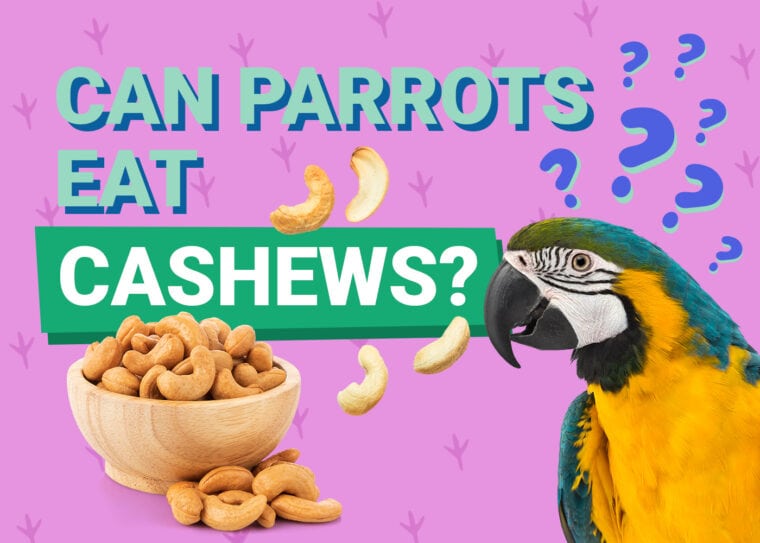
Cashews are often part of the salty goodness included in nut mixes. They can be seasoned a number of ways or served plain. They are flavorful all on their own. Parrots often appreciate tasty nuts, and they enjoy having a varied diet that includes a wide range of nuts and seeds. If you’ve ever wondered if cashews are safe for your parrot, here are the things you need to know.
 Can Parrots Eat Cashews?
Can Parrots Eat Cashews?
Cashews are a safe nut option for your parrot, but they are best fed plain and unsalted. Salted nuts are often far too high in sodium to make them safe for your parrot. Purchasing plain cashews is going to be the best option, but you can also rinse or soak seasoned cashews to help reduce the sodium content on the nuts, although this is far from ideal. If you’re unable to get plain cashews, your safest, healthiest bet is going to be skipping the cashews in favor of bird-safe plain nuts.
Are Cashews Good for Parrots?
In moderation, cashews are a great treat for your parrot. They are high in protein and healthy fats, which are great for heart health, as well as multiple vitamins and minerals. Cashews are rich in copper, vitamin B6, vitamin E, iron, vitamin K, magnesium, and zinc. Many parrots’ diets are lacking in multiple vitamins and minerals, so cashews can help to fill these gaps in nutrition.
It’s important to keep in mind that cashews are high in calories and fat and can be high in sodium. In large quantities, these excesses can all lead to health problems for your parrot. Too many calories and too much fat can lead to obesity, which can cause health issues like arthritis, fatigue, and a shortened lifespan.
How Many Cashews Can I Feed My Parrot?
The number of cashews you can offer to your parrot will depend on the size of the bird. Since cashews should be fed as a treat, the number should be limited, and they should be offered on an occasional basis. More than once or twice a week is likely too much for most birds. For large parrots, a few cashews can be offered. For smaller parrots, only a couple should be offered.
Remember that a serving size of cashews for a human is 1 ounce, which is only about 18 cashews. An ounce of cashews is 157 calories. When it comes to parrots, an extra small bird, like a parakeet, needs fewer than 20 calories per day and a large bird, like a macaw, requires just over 200 calories per day. This means that if you fed your bird 1 ounce of cashews, you’d likely meet or far exceed its daily caloric needs.

Are There Better Alternatives to Cashews?
When it comes to nuts, they all run relatively high in calories. Pistachios are the lowest in calories at around 85 calories per ounce, making them a better option than cashews. Most nuts run between 150 – 200 calories per ounce, including cashews. Other nuts that are safe for your parrot include macadamia nuts, almonds, hazelnuts, pecans, and walnuts. They can also have peanuts, which are legumes but are often listed with nuts.
For parrots, the base of the diet should be a commercial parrot pellet that is supplemented with veggies and fruits. Nuts and seeds should be offered only as a treat due to their high fat and calorie contents. When it comes to better options than cashews, the best options for special treats are healthy fruits and veggies. Nuts should be reserved for special occasions because of how easy it is to overfeed nuts.
 In Conclusion
In Conclusion
Parrots don’t tend to be picky eaters, happily snacking on most things that are offered to them. It’s up to you to provide your parrot with healthy options, and cashews can be a part of a healthy diet when offered in moderation. They are a treat, though, and not a dietary staple, no matter how much your parrot may love them. It’s your responsibility to keep your parrot healthy, and that includes limiting treats and focusing on a healthy diet.
Cashews are a nutrient-dense food, though. As part of a balanced diet, they can help your parrot meet all of its nutritional needs. Many parrots lack the necessary nutrients to maintain health. Even treats can help fill gaps in your parrot’s nutrition. Cashews aren’t a necessary part of the diet, but they can be a healthy, beneficial part of the diet with proper care and moderation.
Also see:
- Do Parakeets Make Good Pets? Care Tips & Things to Know
- Blue-Headed (Coulon’s) Macaw: Traits, History, & Care (with Pictures)
Featured Image Credit: Rogeriof, Shutterstock

 Can Parrots Eat Cashews?
Can Parrots Eat Cashews?





